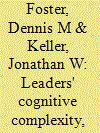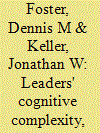| Srl | Item |
| 1 |
ID:
133584


|
|
|
|
|
| Publication |
2014.
|
| Summary/Abstract |
Some scholars have suggested that when faced with domestic political problems, leaders employ simplified decision processes, preferring action to deliberation and highly visible diversionary uses of force to alternative policies. Others contend that domestically embattled leaders will pursue a more rational examination of the costs and benefits of various options-the sort of deliberation that will lead them to reject diversionary force in favor of less risky measures. Drawing on research in political psychology, we argue that leaders' cognitive processes are not constants but variables, and that both models are correct under certain circumstances. Leaders low in conceptual complexity (CC), and especially those with hawkish leanings, will pursue simplified decision-making procedures and embrace diversionary strategies, while leaders who are high in complexity will pursue a more thorough consideration of risks and alternatives and generally avoid diversionary actions. We examine these expectations by testing the interactive effect of economic misery and leaders' CC on American force usage for the period 1953-2000. The findings indicate that more conceptually simple leaders-particularly when high in distrust, a trait linked to more hawkish policy inclinations-are significantly more likely to engage in diversion.
|
|
|
|
|
|
|
|
|
|
|
|
|
|
|
|
| 2 |
ID:
133583


|
|
|
|
|
| Summary/Abstract |
Some scholars have suggested that when faced with domestic political problems, leaders employ simplified decision processes, preferring action to deliberation and highly visible diversionary uses of force to alternative policies. Others contend that domestically embattled leaders will pursue a more rational examination of the costs and benefits of various options-the sort of deliberation that will lead them to reject diversionary force in favor of less risky measures. Drawing on research in political psychology, we argue that leaders' cognitive processes are not constants but variables, and that both models are correct under certain circumstances. Leaders low in conceptual complexity (CC), and especially those with hawkish leanings, will pursue simplified decision-making procedures and embrace diversionary strategies, while leaders who are high in complexity will pursue a more thorough consideration of risks and alternatives and generally avoid diversionary actions. We examine these expectations by testing the interactive effect of economic misery and leaders' CC on American force usage for the period 1953-2000. The findings indicate that more conceptually simple leaders-particularly when high in distrust, a trait linked to more hawkish policy inclinations-are significantly more likely to engage in diversion.
|
|
|
|
|
|
|
|
|
|
|
|
|
|
|
|